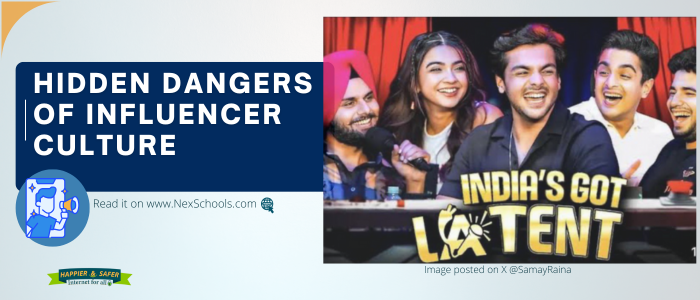
 Mradula Singh, Founder NexSchools
Mradula Singh, Founder NexSchools
 Stay Connected
Stay Connected
In today’s digital age, the rise of influencer culture has reshaped how young people consume content and form opinions. Recent controversies, such as those surrounding podcaster and YouTuber Ranveer Allahbadia (popularly known as BeerBiceps), have sparked outrage among parents who worry about the kind of influence these figures hold over impressionable children. Allahbadia’s recent comments in an episode of India’s Got Latent have led to public backlash and even legal scrutiny.
This incident has ignited concerns among parents, as influencers like Allahbadia often serve as role models for young audiences, including children as young as 9 or 10 years old. The pervasive nature of digital media means that clips from such shows can easily circulate as reels or shorts, capturing the attention of impressionable minds.
However, the concern extends far beyond a single controversy. Parents are alarmed at how their children are consuming content from influencers who often present an exaggerated or even misleading persona. These content creators, backed by well-executed PR campaigns and branding strategies, shape their online personalities to attract followers and build a devoted audience, creating an illusion of authenticity that many young viewers fail to see through. Strategically edited short-form content serves as bait to lure young viewers into deeper engagement, and many children, lacking critical thinking skills, accept what they see at face value without questioning its validity.
Read More
No YouTube, No Instagram - Is India Ready to Ban Social Media for Kids
Minimum Age Limits for Social Media Use Worldwide
CTRL Movie Review - Why Parents Should Be Worried
How Schools Get Involved With Cyber Safety Awareness Week
All You Need to Know About APAAR - A Guide for Parents
SCERT Delhi Organizes Training for ICT Teachers to Prepare for an AI-Driven Future
The internet allows influencers to reach millions, yet young viewers do not always understand the carefully curated nature of these personas. Many influencers are not journalists bound by ethical standards; instead, they are entrepreneurs leveraging engagement tactics that prioritize popularity over responsibility. The ease with which these figures gain influence over young minds raises critical concerns about the lack of digital literacy among children.
Despite these growing concerns, schools have done little to address the issue. Digital literacy and media awareness are still sidelined in most educational curricula. Parents are left to navigate this challenge alone, without institutional support from schools that should ideally play a key role in educating children about the realities of the digital world. In an era where social media presence is nearly inescapable, simply teaching children traditional subjects is no longer enough. Schools need to incorporate structured programs to help students differentiate between genuine information, exaggerated branding, and misleading content.
Many experts have recommended that digital literacy be an integral part of school curricula to counteract the overwhelming influence of digital personalities. Dr. Samir Parikh, from Fortis and a renowned psychiatrist, highlighted the vital role of media literacy in addressing influences and peer pressures in his talk with NexSchools' Edu Talk series on the topic role of media literacy among teens and youth. He emphasized that understanding the nuances of digital content is crucial for young people to navigate the complexities of the online world safely.
It has raised a big question about Freedom of Expression vs. Ethical Responsibility. While influencers have the right to freedom of expression, many parents argue that they should also exercise self-discipline. The fine line between entertainment and harmful content is often blurred, with some influencers justifying offensive remarks under the guise of humor. This not only sets a poor example but can also encourage cyberbullying and toxic behavior among young audiences.
A post on the social media moms group stirred the conversation, with concerned mother Sunayna Pahuja expressing her distress:
“I saw a clip of Ranveer Allahbadia, and it left me deeply unsettled. My son followed him religiously until that moment. I used to appreciate how he steered clear of vulgarity, but now I see that wasn’t enough. Even influencers who seem responsible at first can spread problematic ideas.”
The discussion continued with Ranii Kaur emphasizing accountability:
“What we need is accountability. We need conversations, awareness, and a shift in mindset - so that those involved truly understand why this is wrong.”
Priyanka Popli, another worried mother, voiced her concerns about the growing trend of offensive humor:
“Very true, as a mother I just do not understand the concept of roasting.. why? On one hand we’re teaching our kids to be kind, be tolerant, be inclusive.. and on the other hand, this kind of content is being served to them. There’s just no censorship, no limit to any abuse or vulgarity. It’s high time that OTTs and YouTube also have some solid censorship. Some restraint on the content, as well as comments.
I don’t understand those people who get roasted willingly on such podcasts. Isn’t it too big a price to pay for your 2 minutes of fame?”
Parents voiced numerous concerns on different groups of WhatsApp and expressed their worries about the normalization of bullying in entertainment. As parents and citizens, they emphasized the importance of being mindful of the media we consume and support.
Raising awareness about such issues is crucial, and parents hope more people will reflect on this and take a stand against toxic content.
The Need for Media Literacy in Schools
With digital content shaping young minds, media literacy has never been more crucial. Initiatives like the Happier and Safer Internet (HSI) campaign emphasize critical thinking, helping children differentiate between entertainment and reality. However, awareness alone is not enough, schools must take responsibility.
While some institutions touch on internet safety, deeper discussions on media ethics and digital influence are largely absent. Parents are left to bridge this gap, but they cannot do it alone. Schools need to integrate media literacy into their curriculum, ensuring students learn to question, analyze, and engage with online content responsibly.
Until then, children remain vulnerable to the unchecked power of influencers, and parents must continue to navigate these challenges without sufficient institutional support. It’s time for educators to recognize their role in preparing the next generation for a digital-first world.
Parenting Tip: In the absence of role of schools, the burden remains on parents to guide their children through the noise of digital media. Short Courses can equip with the right knowledge and skills:
Explore the short courses:
Register as a school member
School Membership of NexSchools comes loaded with many free benefits, insights and  ideas
ideas
Parenting Concerns in digital age | Are Teens nd Youth taught by influeners | #InfluencerCulture #DigitalParenting #MediaAwareness #OnlineSafety #YouthInfluence #ParentalConcerns #MediaLiteracy #CriticalThinking #SchoolResponsibility